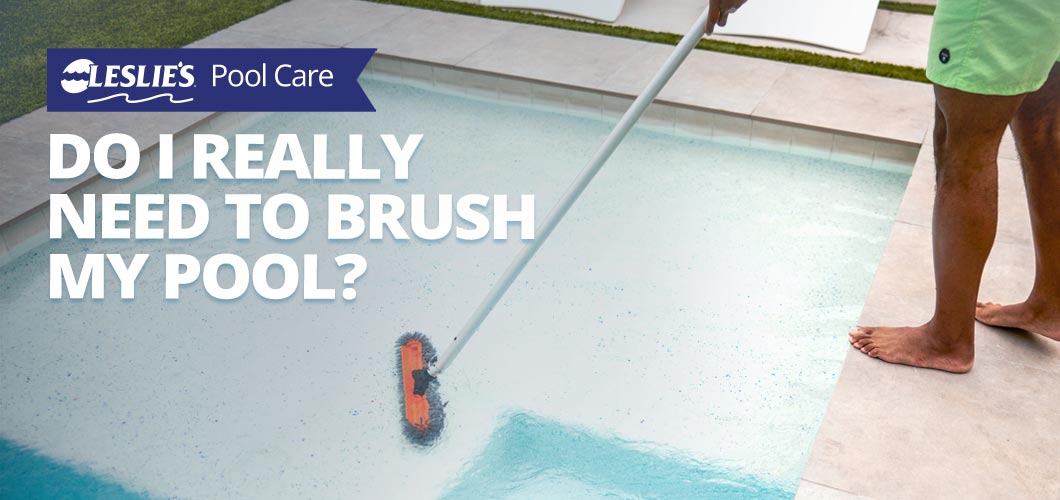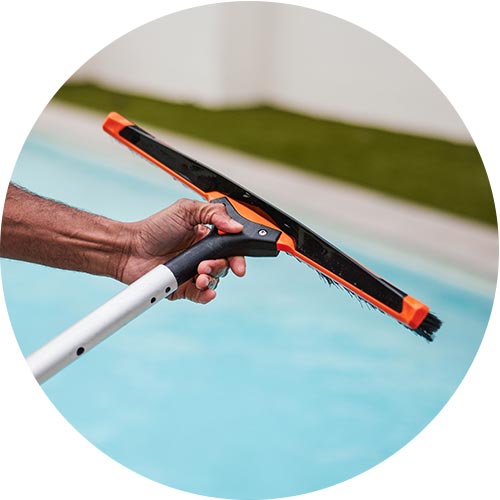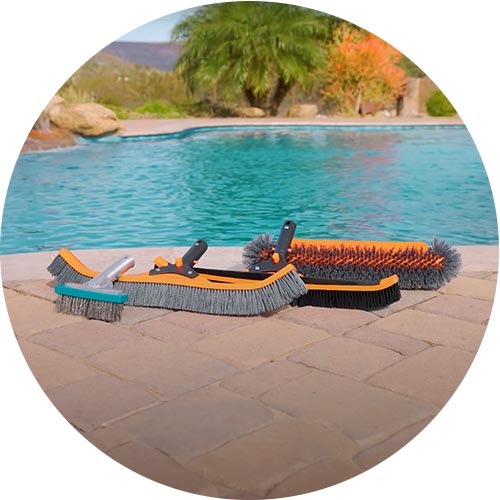
Do I Really Need to Brush My Pool?
Maintaining a sparkling clean pool is about more than just aesthetics. Cleaning the pool often helps avoid recurring issues with algae, organic stains, and inefficiencies in your pool system. When you see a beautiful pool, one that is both functional and enjoyable, you know that a lot of work went into maintaining its attractive luster. Most pool owners are familiar with standard cleaning tasks, such as skimming and vacuuming debris from the pool. However, a lot of pool owners fall short on one simple, yet often overlooked task — brushing the walls, steps, and floor of their pool.
Pool Brushing — What Is It?
Brushing the pool involves scrubbing the walls, floor, and other pool surfaces with a large brush designed for your pool’s surface type. With regular brushing, you can keep your pool in pristine condition, as well as avoid significant and pesky issues that affect the health of your pool. This actually brings us to our next point…
Why Should You Brush Your Pool?

Many pool owners question if the oftentimes tedious act of brushing your pool is an absolute necessity, and we’re here to tell you that IT IS. While it can feel time-consuming, brushing your pool is an integral part of the cleaning process. Here are just a few reasons why you’ll never want to skip this step again.
Improves Your Pool’s Appearance and Prevents Buildup
Setting aside time to brush your pool has many advantages, the most obvious being that it enhances the look of your pool. By skipping the crucial step of brushing your pool, you’re making it easy for fine dirt, debris, algae spores, and other contaminants to cling to pool surfaces and evade sanitization and filtration.
Over time, those contaminants accumulate, especially in hard-to-reach areas with low circulation, such as pool steps and corners. The waterline is also notorious for accumulating an unsightly line of oily buildup. Manually brushing your pool helps release these particles from pool surfaces, giving your pool a spotless look and feel. Those clear waters and clean surfaces only add to the charm that a pool provides. Who doesn’t love that?!
BONUS TIP: Not only does algae look bad, it can also make pool surfaces slick! When brushing the pool, give your steps a little extra TLC to prevent algae growth and avoid a potential safety hazard.
Brushing Helps Your Sanitizer Break Down Contaminants
Your sanitizer is only as effective as your pool cleaning routine. As we mentioned earlier, taking a few extra minutes each week to brush your pool helps dislodge algae spores and contaminants from pool surfaces. Brushing those particles out into the open water makes it much easier for your Free Available Chlorine to make contact and break them down. This also makes it easier for your pool cleaner to remove the loosened, settled debris, and your filtration system can more easily filter out suspended debris. If you have recurring problems with algae in your pool, regular brushing helps disrupt the cycle to keep it from coming back.
Prevents Oily Buildup and Scale Formation
Over time, things such as body oils, lotions, and sunscreen can cause an oily residue to stick to your pool walls, creating a dirty-looking “bath ring” along the waterline. If you pair that with imbalanced water, scale formation can leave troublesome calcium stains and film on pool surfaces and around the waterline, as well. Brushing acts as a preventative measure, keeping buildup at bay while maintaining a beautiful-looking pool.
BONUS TIP: If you're having issues with oily residue or calcium scale at the waterline, adding specialty chemicals can help keep the pool cleaner. Using enzyme products such as, Leslie's Clear Aid or Leslie's Perfect Weekly can help break down oily residues. For scale issues, products like Leslie's Stain and Scale Prevent can help.
Expert Brushing Tips
Whether you’re new to pool ownership or just looking for new pool care tips, there are a few things you need to know so you can effectively brush your pool.
Choose the Right Brush for the Job

The type of pool you have will determine which kind of brush you need to use. Sensitive pool surfaces — like vinyl, fiberglass, or paint — will do better with a soft nylon or polypropylene pool brush. On the other hand, a sturdier brush made of wire or stiff poly bristles are best suited to pool surfaces that can handle the harder scrubbing, including gunite or tile pools. There are short brushes, wide brushes, and brushes with rounded or tapered ends to help you reach all the nooks and crannies in your pool.
Stick With a Consistent Routine
We suggest taking at least a few minutes once a week to brush your pool. However, there are some occasions where you may need to brush more often. For example, if you recently experienced stormy weather, hosted a pool party, or are in the process of treating algae, a more diligent brushing routine may be necessary to clean up the mess.
Even though cleaning a pool isn’t as exciting as swimming in one, the effort that it takes to brush your pool on a weekly basis won’t go unnoticed. For more information on pool care, equipment maintenance, and anything else pool and spa related, read our blog for more in-depth information, visit our YouTube channel for videos on pool care, or stop by your local Leslie’s and speak with one of our expert associates!